What to Consider Before Buying a Business in Singapore Key Factors to Evaluate

Singapore’s dynamic and thriving business environment attracts entrepreneurs and investors worldwide. If you’re considering a business to buy in Singapore, you’re entering a market that offers numerous opportunities for growth and success. As a business hub in Southeast Asia, it provides a variety of prospects for those looking to start or expand a business. However, buying a business is a significant investment, and it’s essential to carefully evaluate all factors before making a decision. This article will guide you through the key elements to consider when buying a business in Singapore, helping you make a well-informed choice.
Understand Your Reasons for Buying a Business
Before diving into the technicalities of purchasing a business, it’s important to clarify your own motivations. Are you seeking to grow an existing business, or do you want a business that aligns with your personal interests and expertise? Understanding your business goals is crucial, as it will influence your decision-making process.
Assess whether you are ready for a long-term commitment and if the business has potential for growth in the future. Consider your skills and experience – do they align with the industry and operations of the business you plan to buy? Knowing why you want to buy the business will help ensure that you are fully committed and prepared for the journey ahead.
Legal and Regulatory Considerations
In Singapore, there are specific legal and regulatory requirements you must comply with when buying a business. The first step is ensuring that the business is properly registered and licensed according to Singapore’s laws. You’ll need to understand the legal structure of the business (e.g., sole proprietorship, partnership, or private limited company) and make sure that it complies with all relevant business regulations.
It’s important to conduct due diligence to verify the business’s legal standing. This includes reviewing contracts, intellectual property rights, and any other legal agreements. Understanding Singapore’s regulatory environment—such as taxes, labor laws, and industry-specific regulations—will help you avoid any surprises down the road.
Financial Health of the Business
One of the most important factors to assess when buying a business is its financial health. A comprehensive review of the business’s financial statements, such as profit and loss, balance sheets, and cash flow statements, will provide you with a clear picture of its financial standing.
Valuation is a key part of this process. You’ll need to determine how much the business is worth, factoring in its current revenue streams, assets, and liabilities. Make sure to assess any outstanding debts and risks that may affect its future profitability. It’s highly advisable to seek a professional audit or financial advisory service to get an accurate financial picture and to guide you in this complex process.
Business Market and Industry Analysis
In addition to reviewing the business’s internal financial health, understanding the industry and market dynamics is essential. Evaluate the competitive landscape—who are the main players in the market, and what is the business’s position in relation to them?
You’ll also want to identify current market trends, consumer demands, and how these factors could impact the business’s performance. Understanding the potential for growth and how the business is positioned in its industry will help you make an informed decision about its future viability.
Operational Assessment
A business’s operations are the backbone of its success. Review the business’s day-to-day operations, including efficiency, processes, and supply chain management. Identify areas where improvements could be made to increase productivity and reduce costs.
It’s also important to assess the business’s workforce. How is the employee structure? Are there any concerns regarding employee retention or satisfaction? A business’s customer base and its relationship with clients are critical, so ensure these are stable and growing.
Additionally, evaluate the business’s assets, including technology, equipment, and facilities. Assess how the location impacts the business’s performance, especially in terms of foot traffic, convenience, and access to suppliers.
Risk Assessment
All businesses come with risks. When buying a business, you’ll need to identify potential risks, including financial, legal, and market-related. It’s important to understand how past risks have been managed and what measures are in place to mitigate them in the future.
Consider factors such as market volatility, economic conditions in Singapore, and how they might affect the business’s performance. Thoroughly assessing risk will help you prepare for challenges and ensure that you are equipped to handle them.
Transition and Succession Planning
When buying a business, it’s crucial to have a clear plan for the transition phase. How will the business continue to operate after the purchase? Will the previous owner be involved during the transition to ensure smooth operations?
Understand how the change in ownership will impact employees and clients. A seamless transition can help maintain business continuity, minimize disruptions, and ensure that the business’s culture and leadership are upheld.
Exit Strategy and Return on Investment (ROI)
It’s essential to have a plan for the future, including how you intend to exit the business in the long term. Assess the projected return on investment (ROI)—how soon can you expect to start seeing profits, and what factors will affect the rate of return?
Think about possible exit strategies, such as selling the business, merging with another company, or even going public. Knowing your exit options in advance will help you make better decisions about the business’s long-term potential.
Financing Options for Buying a Business in Singapore
Purchasing a business requires capital, and there are various financing options available. You may consider traditional bank loans, investor funding, or even government grants. Research the options available to you and determine which ones align best with your financial situation and the business’s funding needs.
Singapore offers several government programs and support for entrepreneurs, so it’s worth exploring these as well. Understanding your own financial capacity and the funding requirements of the business will be crucial in determining how to proceed.
Professional Assistance and Advisory Services
Buying a business is a complex process that requires professional guidance. Engaging legal, financial, and business consultants will ensure that you make well-informed decisions. Business brokers and M&A specialists can also help you navigate the buying process, providing valuable insights and assistance.
Choosing the right advisors can make a significant difference in the success of your purchase. Look for experienced professionals who have a deep understanding of the Singapore market and can offer tailored advice to suit your specific needs.
Conclusion
Buying a business in Singapore is an exciting opportunity, but it’s essential to carefully consider all factors before making a decision. From understanding your reasons for purchasing to evaluating the business’s financial health and legal standing, each step requires thorough research and due diligence.
By considering all these factors and seeking professional advice, you’ll be well-equipped to make an informed decision that aligns with your business goals and ensures long-term success. Taking the time to carefully evaluate the business before purchase is crucial for a smooth transition and continued growth.





